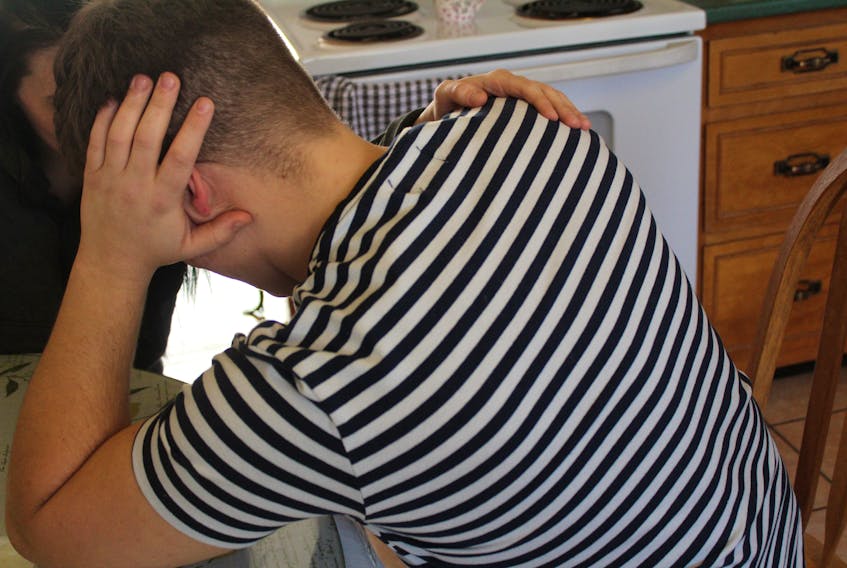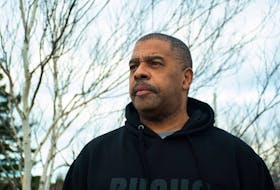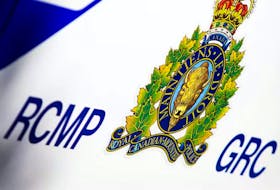Editor's Note: This story contains sensitive details that may upset some readers. This article is part of a special report on sexual assault in Cape Breton, N.S.
SYDNEY, N.S. - Tom was working a respite care shift in Sydney when a masked man grabbed him from behind on Oct. 12 around 8 p.m.
The continuing care assistant had stepped out of his client’s residence to make a phone call when the man attacked from behind. Forcing him into a common-use room near the residence, Tom said the man told him he had a gun and “he would use it,” then physically restrained him while sexually assaulting him.
Because a number of elderly residents live in the building, located on Kings Road, Tom didn’t yell for help. He didn’t want to risk someone like an “88-year-old woman” coming out and getting hurt if the assailant did have a weapon
“I didn’t want to put another vulnerable, person at risk,” he said, sitting at his in-laws’ kitchen table on Oct. 24, his partner showing silent support at his side.
“He used forms of restraint (that made me think) he knew martial arts or something … If he hadn’t of caught me off guard, he wouldn’t have gotten me into the room like that."
Tom spoke to the Cape Breton Post on the condition of anonymity, due to the nature of the crime and the ongoing investigation. He said his assailant was a “big guy”, strong and seemed to “know what he was doing”.
“He used forms of restraint (that made me think) he knew martial arts or something ... " — Tom
After the assailant partially removed some of Tom’s clothes and touch his genital area, the attacker realized Tom wasn’t a cis male (biological male) — he is transgender.
“He seemed shocked,” said Tom. “He said, 'Oh, you’re a tranny.'”
This statement makes Tom believe the perpetrator was targeting a cis male.
During the attack, Tom was able to convince his attacker to let him adjust his body, giving Tom a chance to punch the assailant in the testicles repeatedly until he could get free.
Once safe inside the client’s residence, Tom called 911 and waited on the line until police arrived.
Cape Breton Regional Police spokesperson Desiree Vassallo confirmed officers responded to the incident on Oct. 12 and that the major crime unit is investigating.
“Police are investigating an allegation of sexual assault during the evening of October 12th inside a residence on Kings Road,” she said via email.
“We can’t speak to specifics of an ongoing investigation, but investigations of this nature includes a process of statements and the collection of any other evidence — for example video and forensics — to confirm the circumstances of what happened. This can be a lengthy and complex process.”
While waiting for officers to arrive, Tom watched, through the peephole of the residence door, as the assailant ran down the hall, but could not tell if he had left the building.
Two female and one male police officer responded to Tom's call and he said the questioning felt more like he was being treated as a suspect rather than a victim.
“Police made me feel like I had assaulted somebody instead of the other way around,” Tom said, describing the line of questioning as “weird” and comparing it to “interrogation.”
One of the responding officers asked Tom if the assailant knew what “ethnicity” he was, making Tom — an obviously Caucasian man — think the officer was referring to his gender identity and had no experience with the trans community.
Tom also felt uncomfortable with how much the officers fixated on when the assailant realized Tom wasn’t born a male.
“The females were the worst,” he said.

At one point, one of the female officers asked, "When did the assailant know you were transgender?”
As Tom was explaining the assailant was touching his genital area, he said she cut him off and said, “He realized that you didn’t have a dick?”
“For a trans person, that’s extremely wrong,” Tom said, obviously still angered by the comment. “It can cause a trans person to kill themselves.”
Denis Jonatan Dube, a mental health clinician with the Nova Scotia Health Authority in Sydney, specializes in trans health and said it’s extremely harmful to a trans person to be misgendered. This is because trans people are in conflict with their body which isn’t biologically the way they know it should be.
“The trans community are victims of systematic prejudice. The system isn’t doing it’s best to keep them safe. Things that seem as little as misgendering (or dwelling on gender) can be very triggering to a trans person,” he said.
Trans people are one of the highest groups at risk of suicide from their teens into their twenties and Dube said this usually coincides with when they begin discovering and accepting their gender identity.
“I think there needs to be mandatory training for law enforcement and other authorities about sensitivity and how to address the trans community.” — Gabriel Enxunga, Youth Project (Halifax)
The comment the officer made to Tom is something Dube calls a “microaggression.”
“Trans people encounter that 100 times a day,” Dube explained. “They are treated differently, stared at, misgendered, talked about — which you think they don’t hear but they do. All this adds to their sense of feeling secure or not.”
Gabriel Enxunga, support service co-ordinator for the Youth Project (Halifax), does work with many youth in the LGBTQ+ community who are survivors of sexual violence. Stories like Tom's are common.
“I think there needs to be mandatory training for law enforcement and other authorities about sensitivity and how to address the trans community,” Enxunga said.
There is already a “mistrust” of police within the trans-community and Enxunga pointed out misgendering adds to that. And that mistrust is a contributing factor to underreporting of crimes against trans people.
Tom felt as if he was a “burden” to police when giving his statement and thought they seemed “nonchalant” about the attack, which had left him shaking uncontrollably.
Wanting to do the rape kit and anything else to help police find the assailant, Tom said officers asked if someone could drive him to the hospital. When he said no, they left him at the residence to drive himself there.
To the best of his knowledge, police hadn’t checked the perimeter and Tom had to walk to his car alone.
When asked when police escort victims of sexual assault to hospital for these types of medical exams, police spokesperson Magnus didn't give specifics.
"Police encourage this (rape kit) examination as soon as practical, but the timing is different in every case, depending on a number of circumstances, including: length of time since the incident and when it’s reported, the presence of evidence, the willingness of the victim to co-operate (it’s voluntary, not forced), and the nature of the alleged assault. It’s also possible that a victim completes this examination on their own at the hospital with a SANE nurse, before police are contacted,” she said.
Tom also questions why police didn’t give him information regarding crisis lines and sexual assault support systems in the area. Although responding officers talked about crisis, Tom said nothing was given to him in writing to refer to later.
“They just mentioned it,” he said. “And I didn’t write anything down. I had my head down, shaking, just trying to tell them what happened.
Rachel Doucette is the SANE (Sexual Assault Nurse Examiner) program co-ordinator, which runs out of the Every Woman’s Centre in Sydney. While she can’t comment on policies or operations of other organizations, Doucette said the SANE team of trauma-informed care nurses often work in partnership with police. SANE nurses are the ones who do the forensic exams (rape kits) and collect evidence, which can be frozen for up to six months, for police investigations.
Dealing with victims who have been sexually assaulted within the last five days, Doucette said she knows it can be hard to retain all information being thrown at you after suffering a trauma.
“It’s a traumatic experience. Some people need time to think,” said Doucette.
“We know it’s overwhelming for people, so when we see them, we hand them a pamphlet telling them everything that was done (for example medicine administered, examinations done) and who they spoke to so they can look at it later. That way they don’t have to try and remember everything.”
Regional police say they haven’t had reports of any other attacks similar to Tom’s, which is why a public notice about it wasn’t deemed necessary.
Tom and his family hope there truly aren’t any more victims of his assailant, not just that men haven’t reported it.
He also hopes by speaking about his feelings about the police investigation, other trans people won’t go through what he did.
Resources for victims of sexual assault:
- SANE Program: 1-844-888-8068
- Cape Breton Transition House: 902-539-2945
- The Cape Breton Youth Project: 902-578-5801
- NSHA Mental Health Crisis Line: 1-888-429-8167
RELATED:
- Getting help for sexual assault victims in Cape Breton
- NIKKI SULLIVAN: I'm finally telling my truth about sexual assault
- 'Don't walk like a victim': Newfoundland and Labrador high school resource included concerning advice for sexual assault prevention according to email
- Alleged victim cross-examined in sexual assault trial of two former St. F.X. football players
- Services lacking for male victims of sexual assault in Cape Breton, provincially
- Perpetrators of sexual, domestic violence all different says Cape Breton clinician









